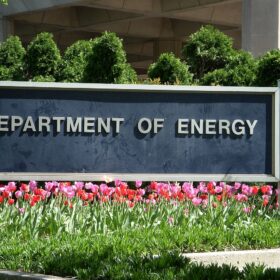US solar industry cut 65,000 workers due to Covid-19, erasing five years of solar job growth
New York, New Jersey, Pennsyvania, and Washington are among the states hit the hardest. SEIA’s analysis shows that vast majority of renewable energy job losses come from the solar energy industry.
The largest US solar-plus-storage plant will deploy 690 MW of bifacial modules on trackers
The Gemini project will be the largest solar plant in the U.S. and among the top-ten worldwide when completed on BLM land near Las Vegas. We spoke with the project developer to get some details on “one of the purest forms of time shifting you’ll ever see.”
SunPower sells off its O&M business to Clairvest, gets regulatory approval for Maxeon spinoff
SunPower has had to make fundamental changes to continue to be relevant in a solar industry very different from that of its roots. The company aims to become an energy service provider and is leaving low-cost manufacturing to its Chinese partner.
Morning Brief: Spruce Finance acquires Clearway Energy’s residential solar portfolio, GM to go 100% renewable at Spring Hill
Also in the brief: Ginlong Technologies plans to raise over $100 million, the US–China trade war and COVID-19 have massively impacted coal financing, SunPower’s planned split and establishment of Maxeon Solar Technologies has received approval in China and more.
Glasspoint, a Shell-funded solar enhanced-oil-recovery startup, is in liquidation
Glasspoint received more than $130M in VC from Oman’s sovereign wealth fund, along with the venture arm of Royal Dutch Shell. The plan was to use concentrated solar arrays housed in glass greenhouses to produce steam at gigawatt scale instead of natural gas for EOR.
A new player appears in American thin-film cadmium telluride solar module manufacturing
Toledo Solar is trying to distinguish itself from First Solar’s cadmium telluride dominance by operating in the residential and commercial markets, markets which have been historically unkind to the technology.
Storing wind and solar with new gravity-based system
Scottish start-up Gravitricity is planning a project to store surplus power from renewables at Port of Leith. A 250 kW, grid-connected prototype facility will have its ability to stabilize the network tested. The system involves a 50-foot rig over a 500 to 5,000 foot shaft.
Solar industry CEOs weigh-in on positive trends in Covid-impacted quarterly results
“We’ve taken how the industry would have evolved – probably in two years – and we’ve done it in a month.” — Lynn Jurich, CEO of Sunrun
Morning Brief: DuPont Publishes 2020 Global PV Reliability Report, when will renewables pass coal?
Also in the brief: remembering the life of S. David Freeman, farmers in Rhode Island receiving solar grants, JA Solar’s upcoming webinar on the future of PV and more.
Overbuilding solar at up to 4 times peak load yields a least-cost all-renewables grid
The global energy firm Wartsila found a least-cost renewables mix for the U.S. that involves overbuilding renewable capacity, but requires no seasonal storage, and needs only four to ten days of multi-day storage capacity. The analysis modeled meeting current uses of electricity, based on projected technology costs for 2030.















